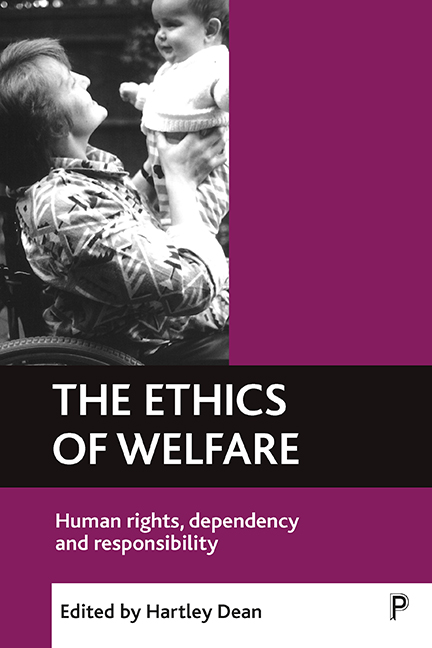seven - Agency, ‘dependency’ and welfare: beyond issues of claim and contribution?
Published online by Cambridge University Press: 20 January 2022
Summary
This chapter is concerned with the concepts of agency and dependency in relation to contemporary welfare reform. In order to explore such issues, it is divided into two main parts. The first begins by critically discussing ‘third way’ theory and its implications for future welfare provision. Notions of agency and dependency are central to such theorising and it is argued that the ways in which these ideas are used and constructed is flawed. The negative implications of a welfare philosophy that over-prioritises the ‘active welfare subject’ (Williams, 1999) while simultaneously understating the importance of continuing (and, in some cases, worsening) social divisions are also briefly discussed. The second part of the chapter draws on two recently completed qualitative studies (see Dwyer, 2000a, 2000b, 2001, 2002; Ackers and Dwyer, 2002) with different groups of welfare service users, and moves on to consider the ways in which users themselves seek to legitimise their own (and certain others’) claims to public welfare, while at the same time justifying the exclusion of other individuals or groups from collective support.
In line with dominant ‘third way’ theorising, many users discriminate between what they see as ‘welfare dependants’ and ‘active citizens’ when making decisions about who deserves the right to public welfare. It is argued that this approach is deeply flawed for three reasons. The first reason is that the dichotomy between passive dependant and active citizen is false (Williams, 1999). Every one of us is welfare dependent in some way at some time (Titmuss, 1958; see also Chapters One and Two of this book), but some are more visible than others (Sinfield, 1978; Mann, 1992). The second reason is that this approach prioritises certain types of ‘responsible’ agency above others (see Chapter Three of this book). Thirdly, it fails adequately to acknowledge that a person’s ability to act in an approved manner is highly dependent on the social and economic resources that they have at her/his disposal (Mann, 2001; Taylor-Gooby, 2001). Finally, in conclusion it is asserted that a society of ‘positive welfare’ (Giddens, 1998) will only become a reality when (or/if) two important elements are adequately acknowledged: first, the continuing significance of structural factors in enabling or constraining the ability of individuals to become active agents; and second, the importance of prioritising our collective interdependence when theorising welfare and enacting social policies in the future.
- Type
- Chapter
- Information
- The Ethics of WelfareHuman Rights, Dependency and Responsibility, pp. 135 - 154Publisher: Bristol University PressPrint publication year: 2004

